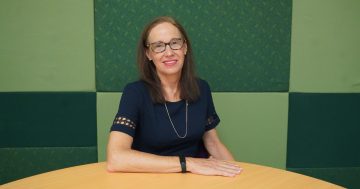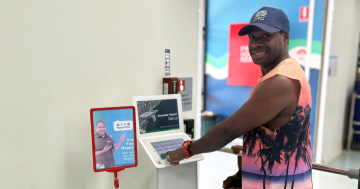
Dr Jessa Rogers was one of the lead researchers on the project.
A LACK of telecommunications in remote areas is preventing kids from spending time out on Country and engaging in cultural activities, a recent study has found.
A team of researchers from the Queensland University of Technology spent significant time on Mornington Island last year to study the impact of digital inclusion challenges for low-income Indigenous families.
The only network provider on Mornington Island is Telstra and the mobile phone coverage only extends to the township.
Dr Jessa Rogers made every trip to the Gulf community for the study and said Mornington Island locals had embraced technology, especially social media, but found it difficult to stay connected.
“A common theme I heard was how the limited mobile phone reception was impacting cultural activities,” she told Cape York Weekly.
“Phone reception stops just out of town and doesn’t cover most of the land and sea of the island.
“Sick and elderly people with safety concerns are scared to leave the township for activities out on Country.
“The lack of mobile coverage on traditional homelands was described as a barrier to youth and Elder engagement in activities on Country.”
In the report, which was published last month, one local said: “If they can fix some things…and put them TV thing out there, I reckon our kids will come out (to the outstations).”
Dr Rogers said telcos and the federal government needed to do better by engaging with communities about their requirements.
“This project has highlighted the importance of collaborating with Indigenous communities in developing digital inclusion research, policies and programs,” she said.
“By involving Indigenous communities in the development of digital policies and programs, digital inclusion efforts can be more effective, sustainable, and equitable in remote Australian communities like Mornington Island.”
Other issues discovered in the study also highlighted a reliance on handheld devices, hotspotting and prepaid services.
“Almost all families were connecting to the internet solely through mobile phones – prepaid data being the main source of data for the entire household,” Dr Rogers said.
“Families of large and small sizes were sharing data from $30 recharge credits (multiple each month) through hotspotting, for browsing, banking, Centrelink/Abstudy, and in the case of children and young people, gaming and YouTube.”
There was also a low uptake of free community Wi-fi, which is installed next to the shop and near the corrections office.
“The location and small range of the wi-fi prevents those with mobility issues/those without a car that have health issues, and, is in an open space that is affected by weather,” Dr Rogers said.





